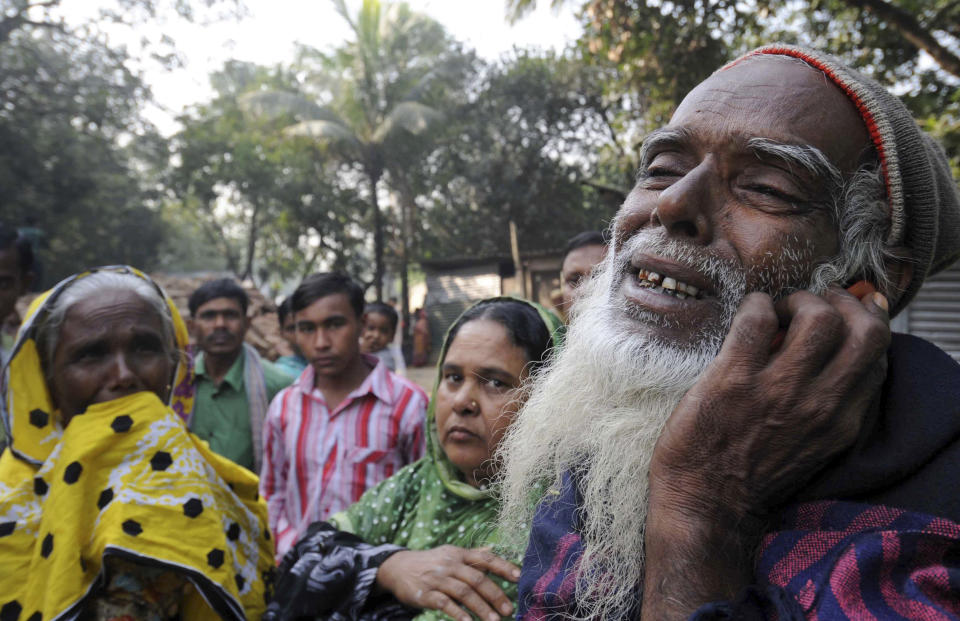Factory fire in Bangladesh highlights poor safety
DHAKA, Bangladesh (AP) — When the fire alarm went off, workers were told by their bosses to go back to their sewing machines. An exit door was locked. And the fire extinguishers didn't work and apparently were there just to impress inspectors and customers.
That was the picture survivors painted of the garment-factory blaze Saturday that killed at least 112 people who were trapped inside or jumped to their deaths in desperation.
For Bangladesh, where such factories commonly ignore safety as they rush to produce for retailers around the world, the tragedy was unusual only in scope: More than 200 people have died in garment-factory fires in the country since 2006.
About 15,000 Bangladeshi workers protested blocks from the gutted building Monday in the Dhaka suburb of Savar, demanding justice for the victims and improved safety. Some 200 factories were closed for the day after the protest erupted. Demonstrators blocked a major highway, threw stones at factories and smashed vehicles.
Maj. Mohammad Mahbub, fire department operations director, said investigators suspect a short circuit caused the fire at the factory, which was making T-shirts and polo shirts.
But the Bangladesh Garment Manufacturers and Exporters Association urged investigators not to rule out sabotage.
"Local and international conspirators are trying to destroy our garment industry," association President Shafiul Islam Mohiuddin said. He provided no details.
Mahbub said it was the lack of safety measures in the eight-story building that made the blaze so deadly.
"Had there been at least one emergency exit through outside the factory, the casualties would have been much lower," he said.
He said firefighters recovered at least 100 bodies from the factory, and 12 more people died at hospitals after jumping from the building. Local media reported that about 100 injured people were being treated at hospitals.
The government was unable to identify many victims because they were burned beyond recognition; they were buried Monday in a grave outside Dhaka. The government announced that Tuesday will be a day of national mourning, with the flag lowered to half-staff.
Survivor Mohammad Ripu said he tried to run out of the building when the fire alarm rang but was stopped.
"Managers told us, 'Nothing happened. The fire alarm had just gone out of order. Go back to work,'" Ripu said. "But we quickly understood that there was a fire. As we again ran for the exit point we found it locked from outside, and it was too late."
Ripu said he jumped from a second-floor window and suffered minor injuries.
Another worker, Yeamin, who uses only one name, said fire extinguishers in the factory didn't work, and "were meant just to impress the buyers or authority."
TV footage showed a team of investigators finding some unused fire extinguishers inside the factory.
It was Bangladesh's deadliest garment-factory blaze in recent memory, but there have been several major factory fires in recent years, including one that killed 63 people in 2006 in southern Chittagong town.
Labor leaders hope outrage over the latest disaster will prompt change. Tahmina Rahman, general secretary of the Bangladesh Garment Workers Federation, said the group wants the government to work harder to punish factories for safety lapses.
"The owners go unpunished and so they don't care about installing enough security facilities," she said. "The owners should be held responsible and sent to jail."
The factory in Saturday's blaze is owned by Tazreen Fashions Ltd., a subsidiary of the Tuba Group that has produced clothing for Wal-Mart, at least in the past. Neither Tazreen nor Tuba Group officials could be reached for comment.
The Tuba Group is a major Bangladeshi garment exporter whose clients also include Carrefour and IKEA, according to its website. Its factories export garments to the U.S., Germany, France, Italy and the Netherlands, among other countries. The Tazreen factory, which opened in 2009 and employed about 1,700 people, made polo shirts, fleece jackets and T-shirts.
Online records appear to indicate the factory was given a "high risk" safety rating after an inspection in May 2011 and a "medium risk" rating in August 2011.
Wal-Mart spokesman Kevin Gardner said it was not clear whether the factory was still making products for Wal-Mart.
"Our thoughts are with the families of the victims of this tragedy," the retailer said in a statement. "While we are trying to determine if the factory has a current relationship with Wal-Mart or one of our suppliers, fire safety is a critically important area of Wal-Mart's factory audit program and we have been working across the apparel industry to improve fire safety education and training in Bangladesh."
In its 2012 Global Responsibility report, Wal-Mart said it stopped working with 49 factories in Bangladesh in 2011 because of fire safety issues.
Bangladesh has some 4,000 garment factories. The country earns about $20 billion a year from exports of garments, mainly to the U.S. and Europe.
The Bangladesh Garment Manufacturers and Exporters Association said it would stand by the victims' families and offered $1,250 to each of the families of the dead.
___
Associated Press video journalist Al Emrun Garjan contributed to this report.



